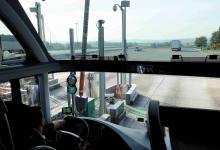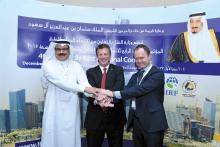IRF Publishes white paper on talent management solutions
On September 15th, 2015, IRF convened a half-day global leadership seminar aimed at examining common talent-related challenges faced by transportation industry actors across the markets where they operate.
Strategic approaches to workforce management and talent development are essential to respond effectively to the changing needs of an increasingly diversified transportation industry. A well-educated, multidisciplinary workforce that is capable
RSSIRF Publishes white paper on talent management solutions
On September 15th, 2015,3918 IRF Washington convened a half-day global leadership seminar aimed at examining common talent-related challenges faced by transportation industry actors across the markets where they operate.
Strategic approaches to workforce management and talent development are essential to respond effectively to the changing needs of an increasingly diversified transportation industry. A well-educated, multidisciplinary workforce that is capable of acquiring new skills is an important asset for transportation solutions providers eyeing new markets and, in many cases, part of their legacy in emerging markets.
While the overarching principles that support talent development programs receive broad consensus, implementing effective approaches need to factor a changing environment faced by most international transportation sector actors.
The globalisation of the corporate workforce is a reality for larger scale actors who operate with multiple sites, nationalities, educational backgrounds, work experience and formal standards (such as building codes). Sometimes egged on by national employment laws, many companies have taken on the task of fostering the local workforce in those countries they are investing in and want to have long-term commitment with.
In recent years, the sector has also been characterised by the emergence of megaprojects, with large-scale investments in a relatively short time frame. These typically require the availability of human and technical assets in large quantities, and present specific transition challenges once the project winds down.
Lastly, individual career paths themselves have become complex, transitioning from ladder to “lattice” models where employees need to chart their own development program across operational and leadership roles, which remaining on top of opportunities to transition to new roles. Systematic information resources and continuing education programs need to be in place to accompany this process.
Road builders form part of a wider community comprised of diverse stakeholders, including government agencies, contractors, suppliers and local universities, and with impacts that extend well beyond the physical assets they leave behind. Investing in legacy talent development programs is a virtuous circle benefiting these actors and giving space for other investments to come. The availability of knowledge transfer programs and a lasting legacy of trained workers thus contribute to the overall socio-economic benefits of new road projects.
IRF White Papers are available here
On September 15th, 2015,
Strategic approaches to workforce management and talent development are essential to respond effectively to the changing needs of an increasingly diversified transportation industry. A well-educated, multidisciplinary workforce that is capable of acquiring new skills is an important asset for transportation solutions providers eyeing new markets and, in many cases, part of their legacy in emerging markets.
While the overarching principles that support talent development programs receive broad consensus, implementing effective approaches need to factor a changing environment faced by most international transportation sector actors.
The globalisation of the corporate workforce is a reality for larger scale actors who operate with multiple sites, nationalities, educational backgrounds, work experience and formal standards (such as building codes). Sometimes egged on by national employment laws, many companies have taken on the task of fostering the local workforce in those countries they are investing in and want to have long-term commitment with.
In recent years, the sector has also been characterised by the emergence of megaprojects, with large-scale investments in a relatively short time frame. These typically require the availability of human and technical assets in large quantities, and present specific transition challenges once the project winds down.
Lastly, individual career paths themselves have become complex, transitioning from ladder to “lattice” models where employees need to chart their own development program across operational and leadership roles, which remaining on top of opportunities to transition to new roles. Systematic information resources and continuing education programs need to be in place to accompany this process.
Road builders form part of a wider community comprised of diverse stakeholders, including government agencies, contractors, suppliers and local universities, and with impacts that extend well beyond the physical assets they leave behind. Investing in legacy talent development programs is a virtuous circle benefiting these actors and giving space for other investments to come. The availability of knowledge transfer programs and a lasting legacy of trained workers thus contribute to the overall socio-economic benefits of new road projects.
IRF White Papers are available here








